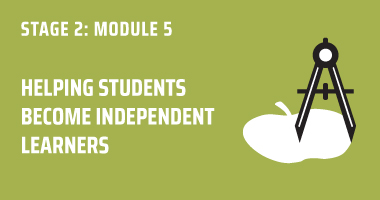Lesson 2 - Setting Up Socio-Cognitive Norms Around Errors
HELPING STUDENTS BECOME INDEPENDENT LEARNERS
TIMING/TASKS: Video Length 20 minutes. To complete this lesson: 1) Watch video to end; 2) Read additional text below; 3) Download & complete exercise(s) in right column
TIMING/TASKS: Video Length 11 minutes. To complete this lesson: 1) Watch video to end; 2) Read additional text below; 3) Download & complete exercise(s) in right column
Reframing Mistakes and Errors as Useful Information
OUTCOMES
LESSONS IN THIS MODULE
DOWNLOADS/ RESOURCES
RESOURCES
EXERCISES
I will assess the current norms and attitudes toward making mistakes in my own classroom or in those classrooms where I coach
I will set up structures, processes, and protocols to help my students move through the four stages of development.
I recognize that my dependent learners are stuck in a pedagogy of compliance and I must coach them through negative mindsets and emotions related to making mistakes
Being ok with making mistakes is essential for engaging in productive struggle. Unfortunately, a pedagogy of compliance reinforces a negative view of making mistakes.
Creating a culture of deep learning and chewing in a culturally responsive classroom begins with reframing errors as information.
We will dive into using this type of information as formative assessment in a later lesson in this module. Right now we are focused on helping students, especially those that are dependent learners, reframe when engaged in productive struggle in the learning pit. This is part of helping them move beyond the pedagogy of compliance.
Grappling is essential for building intellectual capacity. But if one is afraid to make mistakes (what Carol Dweck would call a “fixed mindset”), they won’t engage in grappling or any kind of productive struggle. No struggle = No dendrite growth. No dendrite growth = No increased capacity to carry the cognitive load. The social-emotional aspects of cognitive behavior have to be coached and supported too.
Don’t underestimate the necessity of this.
First thing is making sure to assess your own mindset toward errors and mistakes. Then, you can guide students through a reframe of their mental models about struggle, grappling, and iterating as a way of learning.
ACTION ITEMS
Assess current reality related to your classroom rules and messages around mistakes. What structures and routines need to be put in place.
Familiarize yourself with the list of Socio-Cognitive Norms and begin to script new ways of talking about mistakes when interacting with students during instruction.
Make a plan for moving students through the four stages of shifting their mental models.
Save to My Content

